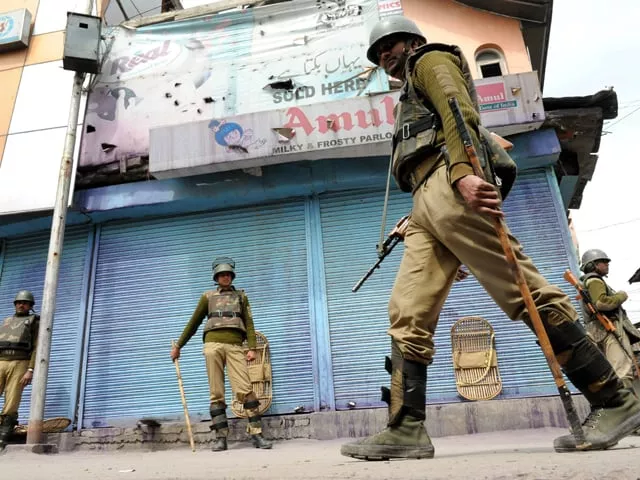People of IIOJ&K continue their fight for self-determination
After sacrificing 100,000-plus lives, Kashmiris say there is no room for any compromise on the plebiscite
MUZAFFARABAD:Kashmiri leaders across the Line of Control ( LoC) termed August 5, 2019, as one of the worst chapters of the Indian Illegally Occupied Jammu and Kashmir’s ( IIOJ&K) history.
What IIOJ&K witnessed on August 5, 2019, was the continuation of the Indian suppression that started in 1947. On that day, India snatched Kashmiri people’s right to self-determination and occupied the whole area by force.
“I don’t believe that Indians had given any type of autonomy to the people of IIOJ&K,” said Azad Jammu and Kashmir (AJ&K) President Masood Khan. “Article 370 and 35A were ceremonial indications just to hoodwink the Kashmiri people. On August 5, 2019, the government of India proved its love for the Hindutva ideology by snatching the rights of the people of IIOJ&K.”
He added that the world was shocked by how bluntly India abrogated Articles 370 and 35A and converted IIOJ&K into prison – a move which serves as a stain on the so-called Indian democracy.
Masood Khan said that India made the move to change the demography of IIOJ&K and convert the Muslim majority into a minority.
“The world is aware of the Indian atrocities taking place IIOJ&K. A time will come when India would be held accountable for what it has been doing in IIOJ&K since 1947,” Khan said.
AJ&K Legislative Assembly Speaker Shah Ghulam Qadir said that on August 5, the so-called Indian democracy was exposed when encaged eight million people in IIOJ&K.
“In this era of information technology, the Indian government cut the internet connection in IIOK&K, stopped local media from reporting, and banned all international media houses to enter IIOJ&K,” Qadir said. “India has to pay for the crimes that it has been committing against the people of IIOJ&K.”
Qadir emphasised that the world must listen to the demands of the Kashmiri people which are following the United Nations resolutions, adding that Indians have no right to coerce Kashmiris.
“The people of IIOJ&K hate Indian forces and Indian rulers who are responsible for their decades-long suffering. This has to end,” he said.
Senior All Parties Hurriyat Conference (APHC) and Chairman Jammu and Kashmir Salvation Movement (JKSM) Altaf Ahmad Bhat said that the abrogation of Article 370 and 35A was a matter of great concern for Kashmiris as they have been long demanding complete freedom from the illegal rule of India.
“Kashmiris have sacrificed more than 100,000 lives while demanding the implementation of United Nation resolutions. Now, there is no room for any compromise on the plebiscite,” said Bhat. “Kashmiris will not allow India to convert the Muslim majority of IIOJ&K into a minority on the Israeli pattern. The world must condemn the move and impose sanctions on India for the human rights violations in IIOJ&K.”
Bhat further said that Kashmiris will continue their struggle for the implementation of UN resolutions in IIOJ&K and changing the status of the region through the abrogation of Article 370 and 35 A would not break their will.
Jammu and Kashmir National Front (JKNF) Vice-Chairman Altaf Hussain Wani said that August 5 marks the beginning of the Indian colonialism project in IIOJ&K to permanently settle Indian nationals there and alter the demography of the region.
“The Indian move to strip Kashmiris of their national identity was a part of its deep-rooted conspiracy to change the Muslim majority state into a minority. The abrogation of Articles 370 and 35A was sought to pave the way for Indian settlers to come and buy properties and settle in the region permanently,” Wani stated.
“This dangerous move fraught with serious political ramifications is seen by Kashmiris as a conspiracy to change the demography of the state and depriving them of their resources, jobs, identity, culture, land, and above all, their promised right of self-determination”, Wani said, adding that the lopsided move was a brazen violation of the international law and the Geneva Convention, which strongly prohibits the alteration of the status of a disputed territory unilaterally.


COMMENTS
Comments are moderated and generally will be posted if they are on-topic and not abusive.
For more information, please see our Comments FAQ